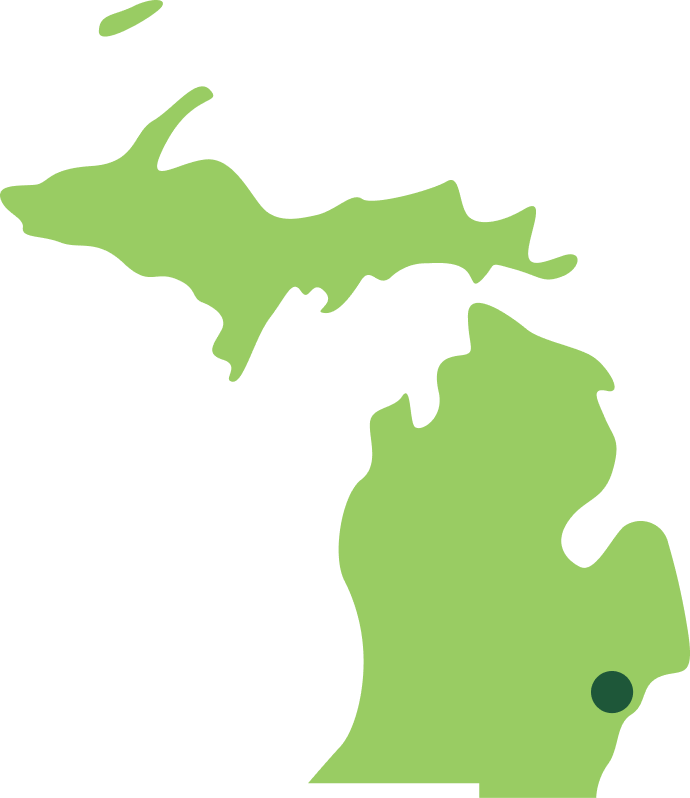Continuing to Meet Community Need
Highlight
Continuing to Meet Community Needs
Michigan
With the cost of many grocery items hovering at historic highs, more and more Americans simply don’t have enough to eat. Without assistance, they don’t know where their next meal is coming from. The need for the Supplemental Nutrition Assistance Program (SNAP, formerly known as food stamps) has never been greater, with more than 40 million Americans relying on the program to put food on the table. And yet, even with SNAP, healthy and nutritious food is often out of reach for families with low household incomes.
Some of the most vulnerable consumers are forced to make daily decisions between buying healthy and affordable food. For Michiganders, that’s where programs like Double Up Food Bucks can help. Participants in SNAP are automatically eligible to use the Double Up program at one of its 234 participating farmers market and grocery store locations. Double Up incentivizes the purchase of healthy food by matching, dollar for dollar, SNAP purchases of fresh fruits and vegetables, up to $20 per day. As one Michigan shopper put it, Double Up is the difference between eating fruits and vegetables and going without. “I couldn’t afford [fresh fruits and vegetables] without the program,” she said. “I wouldn’t be able to try to help my grandmother...and maintain her where we’re at. It’s just me trying to hold things together as much as possible,” she said. “Double Up Food Bucks has helped.”
For many Michiganders, the program is essential. And it’s not only consumers who benefit. All Double Up purchases at farmers markets support local agriculture. And during peak growing season, participating grocery stores stock more locally grown fruits and vegetables in their produce sections. Said one Michigan farmer: “It’s a program that supports small-scale Michigan vegetable growers while also increasing access to fresh, healthy foods for low-income folks — a win-win.”
As farmers markets and Double Up grocers experience the benefits of increased purchases of local produce, the economic benefits ripple outward into communities, making the program a triple win. “We’re able to get assistance and then we’re putting it right back into our community and back to the farmers near our home, and so they’re able to get assistance,” said one SNAP shopper. “It makes for a more thriving market, a more thriving community, socially and economically.”
“Trying to eat healthy, local foods costs hundreds of dollars a month no matter where I shop,” added another. “Not having to worry about this takes so much of the burden off of my plate because otherwise, I would be spending about [as] much as my rent on food, and after that cost I wouldn't normally have much money left over.”
The Double Up program has weathered especially challenging times recently, such as the COVID-19 pandemic, even while helping to mitigate some of the effects of the crisis and take on persistent high inflation that has disproportionately hit food prices. Yet food insecurity predates the coronavirus and inflation, and presents a growing problem in the U.S. Double Up remains an essential community resource no matter what’s happening in the world around us. “We definitely saw a spike in usage during the pandemic — and a lot of new folks,” said Cassidy Strome, Associate Director of Double Up Food Bucks Michigan at Fair Food Network. “And still, even post-pandemic, we’re seeing elevated participation in the Double Up program.”
“People really appreciate — and rely on — Double Up Food Bucks,” she added.
Fair Food Network’s Double Up Food Bucks is a nutrition incentive program that aims to increase fruit and vegetable purchasing among people who use SNAP as part of their monthly food budget. The program is funded by the Gus Schumacher Nutrition Incentive Program (GusNIP), a grant program administered by the United States Department of Agriculture (USDA) with funds appropriated by the 2018 Farm Bill. The Michigan Department of Agriculture and Rural Development (MDARD) is firmly committed to creating marketing opportunities for Michigan fruit and vegetable growers and provides some of the matching funding for Double Up in Michigan.

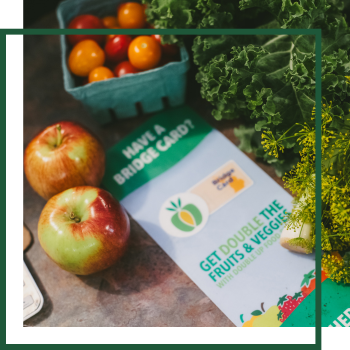 Double Up Food Bucks
Double Up Food Bucks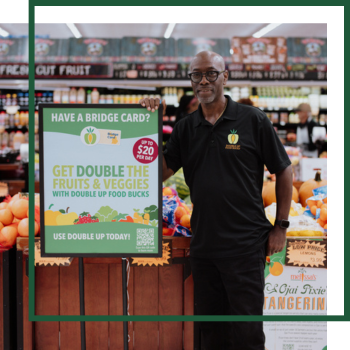 Fair Food Network’s own Double Up Michigan team aims to help families bring home healthy fruits and vegetables while supporting Michigan farmers, in this case by working with grocers and food distribution networks to create more connections between what’s being grown locally and what’s available on store shelves. “Independent stores want to offer more fresh, local options, but they often don’t have the infrastructure, sourcing connections, or volume needed to access Michigan-grown produce consistently,” says Charles Walker, retail specialist. “They need support to bridge that gap—so they can be part of the solution in bringing healthy food closer to home.” Double Up Michigan aims to ensure the nearly 30 food retail locations in the city buy 20% or more locally grown produce during peak growing season in Michigan as a key requirement of being a part of the program. This helps build the market for Michigan farmers by driving demand for locally grown fruits and vegetables as part of the program model. Double Up Food Bucks in Michigan not only helps people using SNAP benefits but also supports farmer viability and keeps dollars circulating in local economies.
Fair Food Network’s own Double Up Michigan team aims to help families bring home healthy fruits and vegetables while supporting Michigan farmers, in this case by working with grocers and food distribution networks to create more connections between what’s being grown locally and what’s available on store shelves. “Independent stores want to offer more fresh, local options, but they often don’t have the infrastructure, sourcing connections, or volume needed to access Michigan-grown produce consistently,” says Charles Walker, retail specialist. “They need support to bridge that gap—so they can be part of the solution in bringing healthy food closer to home.” Double Up Michigan aims to ensure the nearly 30 food retail locations in the city buy 20% or more locally grown produce during peak growing season in Michigan as a key requirement of being a part of the program. This helps build the market for Michigan farmers by driving demand for locally grown fruits and vegetables as part of the program model. Double Up Food Bucks in Michigan not only helps people using SNAP benefits but also supports farmer viability and keeps dollars circulating in local economies.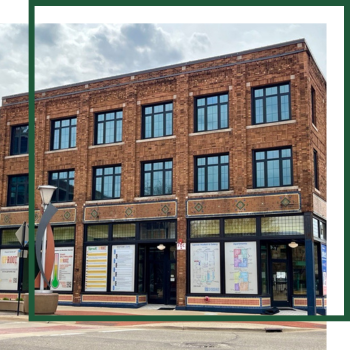 This
This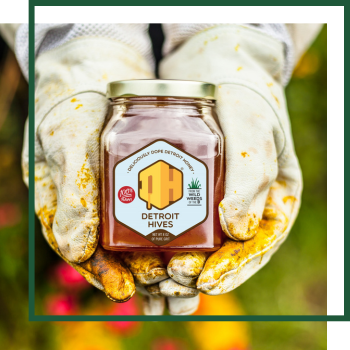 While Danu Hof Family Farm is expanding its operations to meet growing demand, other awardees, such as
While Danu Hof Family Farm is expanding its operations to meet growing demand, other awardees, such as 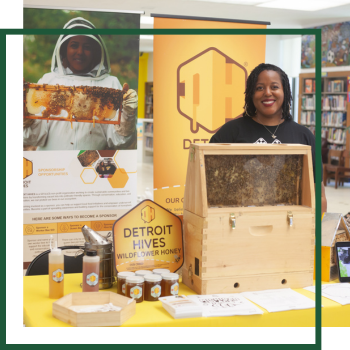 to improve underserved communities for both people and pollinators by transforming blighted vacant lots into
to improve underserved communities for both people and pollinators by transforming blighted vacant lots into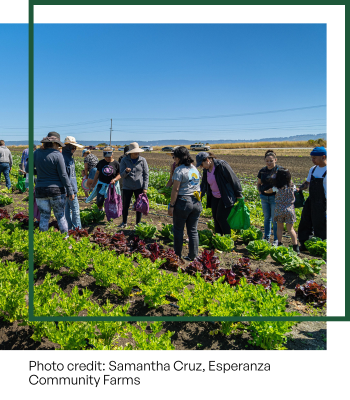 The Hub’s capacity building awards are one way that Fair Food Network is supporting partners who are scaling innovations that contend with nutrition insecurity. As program partners demonstrate the value of these innovations, they are shared with others in the field. “One of the reasons we started the program during the pandemic is because so many federally funded programs were experiencing the same challenges like how to pay for PPE or pivot operations to meet COVID protocols,” says Fair Food Network’s Senior Director of Nutrition Incentives, Erica Christensen Raml. “Since then, the focus of the fund has evolved to continue meeting the changing times. We have found that certain barriers to program usage — like transportation issues or language access — are common program-wide.”
The Hub’s capacity building awards are one way that Fair Food Network is supporting partners who are scaling innovations that contend with nutrition insecurity. As program partners demonstrate the value of these innovations, they are shared with others in the field. “One of the reasons we started the program during the pandemic is because so many federally funded programs were experiencing the same challenges like how to pay for PPE or pivot operations to meet COVID protocols,” says Fair Food Network’s Senior Director of Nutrition Incentives, Erica Christensen Raml. “Since then, the focus of the fund has evolved to continue meeting the changing times. We have found that certain barriers to program usage — like transportation issues or language access — are common program-wide.”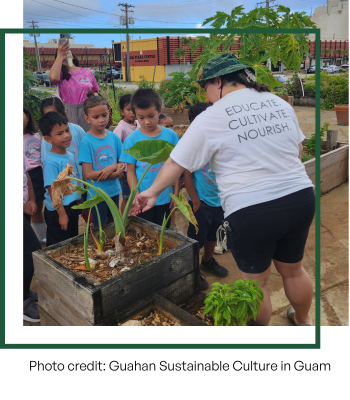 Together with our partners, Fair Food Network is supporting growing demand and helping nascent programs -— from Esperanza Community Farms in Watsonville, CA, to Knowledge Quest in Memphis, to Guahan Sustainable Culture in Guam — to explore innovative methods for service delivery and build organizational capacity to apply for and implement the large federal awards that make the impacts of nutrition incentive and produce prescription projects possible. And while each community’s program has the freedom to adapt to local needs, all — whether new or already established — are finding innovative ways to provide healthy food options for families who need it most, increase sales and expand the customer base for participating businesses, and produce more income for local farmers. “Capacity building grants give us a chance to provide additional support to communities that are innovating in scalable ways and can serve as models of resilience for the nutrition incentive field,” says Raml. “And they’re also a way to fund some really great ideas.”
Together with our partners, Fair Food Network is supporting growing demand and helping nascent programs -— from Esperanza Community Farms in Watsonville, CA, to Knowledge Quest in Memphis, to Guahan Sustainable Culture in Guam — to explore innovative methods for service delivery and build organizational capacity to apply for and implement the large federal awards that make the impacts of nutrition incentive and produce prescription projects possible. And while each community’s program has the freedom to adapt to local needs, all — whether new or already established — are finding innovative ways to provide healthy food options for families who need it most, increase sales and expand the customer base for participating businesses, and produce more income for local farmers. “Capacity building grants give us a chance to provide additional support to communities that are innovating in scalable ways and can serve as models of resilience for the nutrition incentive field,” says Raml. “And they’re also a way to fund some really great ideas.”

